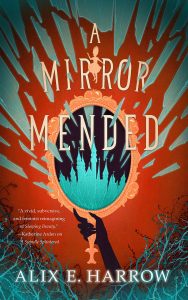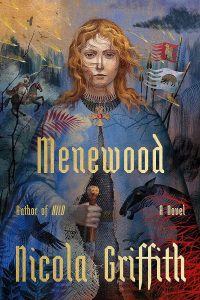Gary K. Wolfe Reviews A Mirror Mended by Alix E. Harrow
 A Mirror Mended, Alix E. Harrow (Tordotcom 978-1-250-76664-9, $18.99, 144pp, hc) June 2022.
A Mirror Mended, Alix E. Harrow (Tordotcom 978-1-250-76664-9, $18.99, 144pp, hc) June 2022.
Although it hasn’t really caught on much, ‘‘bibliofantasy’’ has always seemed to me a useful term for describing a certain kind of recursive fantasy, in which protagonists find themselves transported into classic stories or story-worlds. It has a pretty respectable pedigree, and although some of its earlier classics aren’t read much these days, it’s enjoyed a kind of resurgence in the work of writers like Jasper Fforde and, no doubt, any number of YA authors I’m not familiar with. By far the most commonly visited fictional worlds are those of fairy tales, and I’m repeatedly amazed at how durable these worlds are, despite often being appalling to modern sensibilities, and at how writers can still discover new angles on material that would seem to have been beaten into the pavement decades or even centuries ago. In last year’s A Spindle Splintered, Alix E. Harrow began by zeroing in on the very problematical nature of fairy tales, and of Sleeping Beauty in particular, by making her protagonist not only a scholar of fairy tales, but a young woman with real-life problems of her own: Zinnia Grey is suffering from an environmentally induced condition that is expect to kill her by age 21. After falling into what turns out to be a multiverse of Sleeping Beauty variants, she finds her calling rescuing these various princesses not only from extended naps, but from creepy princes and arranged marriages – in other words, she keeps busy by helping fairy tale heroines discover their own agency.
In A Mirror Mended, after being pulled through some sort of magic mirror, Zinnia finds herself explaining the concept of agency again, but this time in a different story, that of Snow White. And she’s sharing her narrative expertise not with the victimized Snow White herself, but with one of the classic fairytale villains: the evil queen. However, Harrow isn’t quite interested in the sort of revisionist rehab jobs with tragic backstories we see in novels such as Wicked or movies like Maleficent: the queen is indeed a piece of work, and shortly after arriving Zinnia finds herself not only being garroted, but strung up in shackles and told, ‘‘I will feed your beating heart to the carrion birds. I will knap knives from your bones and use them to flense the fat from your breathing body.’’ If this queen’s going to get rehabilitated, Zinnia has her work cut out for her. To complicate matters further, she seems to be in a world in which the membranes between different fairy tales are permeable; the queen has heard of talking wolves in the forest and of a goose with a golden egg. Inexplicably, the queen also has a book which Zinnia recognizes as the exact same copy of Grimm’s fairy tales, down to a stain on the cover, that was Zinnia’s own favorite as a child.
The ingenious dual perspective that made A Spindle Splintered seem so fresh is clearly at work again in A Mirror Mended: Zinnia is trapped within the tale, while at the same time viewing it critically from the outside, as a text; she at one point even thinks how her favorite college folklore professor Dr. Bastille would turn the whole adventure into a scholarly essay. The queen seems aware of her double role as well, trapped by the conventions of the narrative. She complains, for example, that she doesn’t even have a name, and she knows how the story has to end, with that gruesome business of red-hot shoes. What she wants from Zinnia, then, isn’t that different from what the various Sleeping Beauties wanted from her: a way out of their predetermined tales.
Using the queen’s magic mirror as a portal (much like the pricked finger in A Spindle Splintered), they manage to travel through different iterations of the Snow White tale, along the way meeting up with an important character from the earlier novella and a rather liminal figure who introduces herself as Red (complete with all the fairytale variations the name suggests). Zinnia finds herself explaining basic concepts like ‘‘protagonist’’ and ‘‘agency’’ to the queen, who evolves from archetype to character in the story’s most important narrative arc. Zinnia’s own fate remains as unresolved as it was at the end of A Spindle Splintered, reminding us that the predetermined ‘‘ever afters’’ in fairy tales may be their most insidious feature. For now, Zinnia is a wonderfully unique figure in the long tradition of bibliofantasy: a reluctant heroine whose superpower doesn’t derive from spindles or mirrors, but from skillfully deconstructing the very stories she’s in.
Gary K. Wolfe is Emeritus Professor of Humanities at Roosevelt University and a reviewer for Locus magazine since 1991. His reviews have been collected in Soundings (BSFA Award 2006; Hugo nominee), Bearings (Hugo nominee 2011), and Sightings (2011), and his Evaporating Genres: Essays on Fantastic Literature (Wesleyan) received the Locus Award in 2012. Earlier books include The Known and the Unknown: The Iconography of Science Fiction (Eaton Award, 1981), Harlan Ellison: The Edge of Forever (with Ellen Weil, 2002), and David Lindsay (1982). For the Library of America, he edited American Science Fiction: Nine Classic Novels of the 1950s in 2012, with a similar set for the 1960s forthcoming. He has received the Pilgrim Award from the Science Fiction Research Association, the Distinguished Scholarship Award from the International Association for the Fantastic in the Arts, and a Special World Fantasy Award for criticism. His 24-lecture series How Great Science Fiction Works appeared from The Great Courses in 2016. He has received six Hugo nominations, two for his reviews collections and four for The Coode Street Podcast, which he has co-hosted with Jonathan Strahan for more than 300 episodes. He lives in Chicago.
This review and more like it in the April 2022 issue of Locus.
 While you are here, please take a moment to support Locus with a one-time or recurring donation. We rely on reader donations to keep the magazine and site going, and would like to keep the site paywall free, but WE NEED YOUR FINANCIAL SUPPORT to continue quality coverage of the science fiction and fantasy field.
While you are here, please take a moment to support Locus with a one-time or recurring donation. We rely on reader donations to keep the magazine and site going, and would like to keep the site paywall free, but WE NEED YOUR FINANCIAL SUPPORT to continue quality coverage of the science fiction and fantasy field.
©Locus Magazine. Copyrighted material may not be republished without permission of LSFF.







